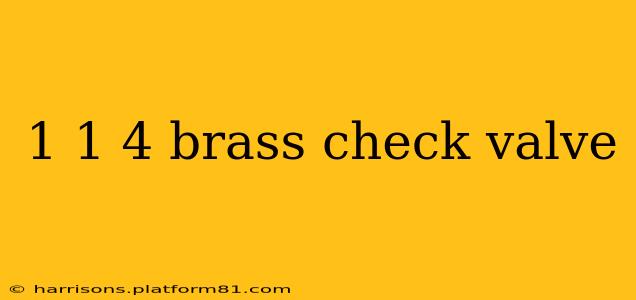Finding the right check valve for your plumbing or industrial application can be tricky. This guide focuses on the 1 1/4" brass check valve, exploring its uses, types, installation, and considerations for selection. We'll answer common questions and provide the information you need to make an informed decision.
What is a 1 1/4" Brass Check Valve?
A 1 1/4" brass check valve is a type of one-way valve that allows fluid (liquid or gas) to flow in only one direction. The "1 1/4"" refers to the nominal pipe size, indicating the valve's inner diameter. Brass is a common material choice due to its corrosion resistance, durability, and relatively low cost. This makes it suitable for a wide range of applications, from residential plumbing to light industrial use.
What are the Different Types of 1 1/4" Brass Check Valves?
Several types of 1 1/4" brass check valves exist, each with its own mechanism and suitability:
-
Swing Check Valves: These valves use a hinged disc that swings open to allow flow in one direction and closes automatically when the flow reverses. They are simple, reliable, and relatively inexpensive.
-
Lift Check Valves: These valves have a disc or ball that lifts vertically to allow flow. They are generally more compact than swing check valves but may be slightly less efficient.
-
Ball Check Valves: These feature a small ball that seals against a seat to prevent backflow. They're typically compact and simple.
-
Foot Check Valves: These are designed for vertical installations and prevent backflow in drainage systems. They’re often used with pumps to prevent water from draining back into the pump.
The best type of 1 1/4" brass check valve for your application depends on factors such as flow rate, pressure, and the type of fluid being used.
Where are 1 1/4" Brass Check Valves Used?
These valves are used in a variety of settings, including:
-
Residential Plumbing: Preventing backflow in water supply lines, protecting against sewage backups.
-
Irrigation Systems: Controlling water flow and preventing water hammer.
-
Industrial Applications: Used in various fluid handling systems where backflow prevention is crucial. (Note: For high-pressure or corrosive applications, other materials may be preferred.)
-
Pneumatic Systems: Controlling air pressure and preventing backflow in compressed air lines.
How Do I Install a 1 1/4" Brass Check Valve?
Installation generally involves threading the valve into the pipework using appropriate pipe fittings and sealant (Teflon tape is commonly used). Always follow the manufacturer's instructions, and ensure the valve is installed correctly to prevent leaks and ensure proper functionality.
What are the Key Considerations When Choosing a 1 1/4" Brass Check Valve?
Several factors influence the choice of a 1 1/4" brass check valve:
-
Flow Rate: Ensure the valve's flow capacity matches your system's requirements.
-
Pressure Rating: The valve must be able to withstand the maximum pressure in your system.
-
Material Compatibility: Brass is suitable for many fluids, but compatibility should be verified for specific chemicals.
-
End Connections: Ensure the valve's end connections (e.g., NPT threads) match your existing pipework.
-
Temperature Range: The valve's operating temperature range should accommodate the fluid's temperature.
What is the difference between a swing check valve and a lift check valve? (PAA Question)
The main difference lies in how the valve closes. A swing check valve uses a hinged disc that swings shut, while a lift check valve uses a disc that lifts vertically to close. Swing check valves are generally simpler and less prone to clogging, while lift check valves tend to be more compact.
How do I know what size check valve I need? (PAA Question)
The check valve size should match the pipe size it’s installed in. A 1 1/4" check valve fits a 1 1/4" pipe. Measure your pipe's inner diameter to determine the correct size.
Can I use a 1 1/4" brass check valve with different types of fluid? (PAA Question)
While brass is generally corrosion-resistant, compatibility with specific fluids should be checked. Some chemicals may corrode brass over time, rendering the valve unreliable. Consult the manufacturer's specifications to ensure compatibility.
How often should I replace a 1 1/4" brass check valve?
The lifespan of a check valve depends on factors like usage, fluid type, and pressure. Regular inspection for leaks or signs of wear is crucial. Replacement is needed if leaks occur or if the valve no longer functions correctly.
This guide provides a comprehensive overview of 1 1/4" brass check valves. Remember to consult a qualified plumber or engineer for complex installations or applications involving high pressure or hazardous fluids.
